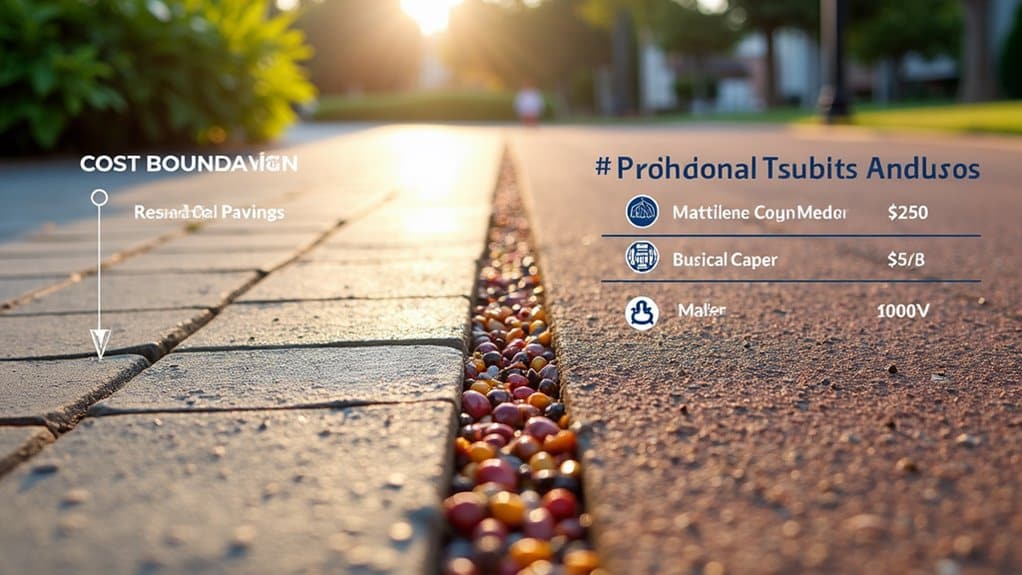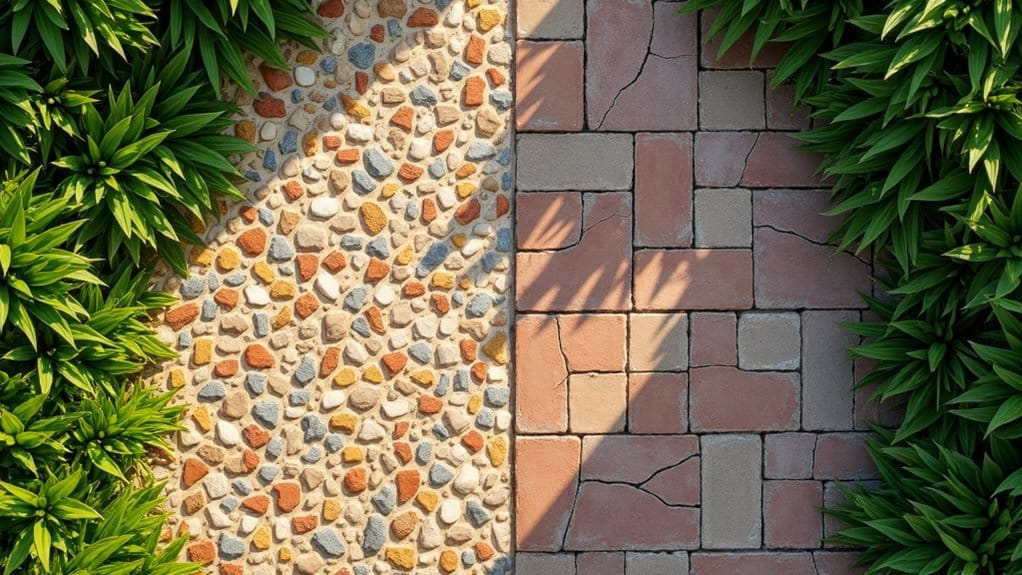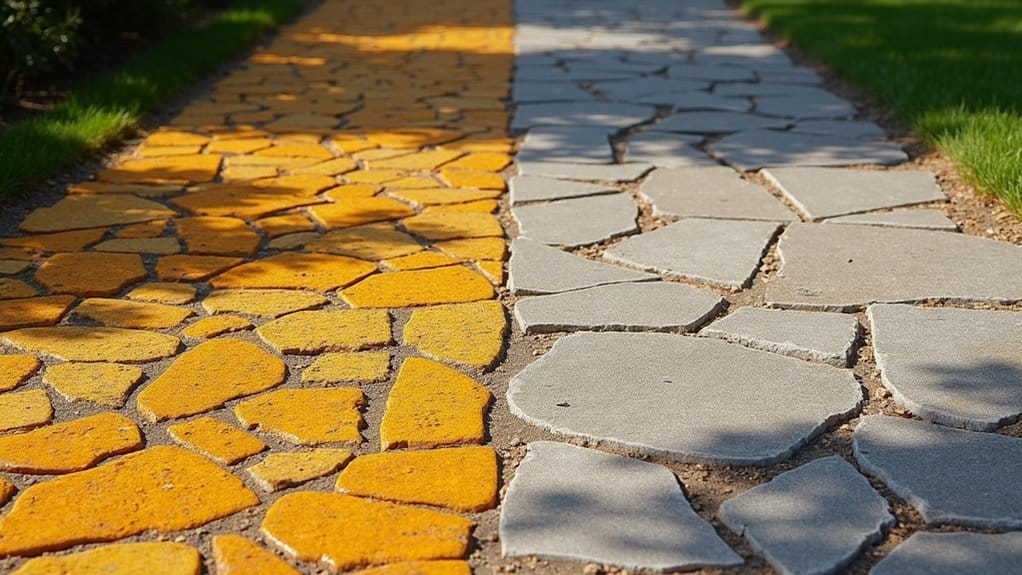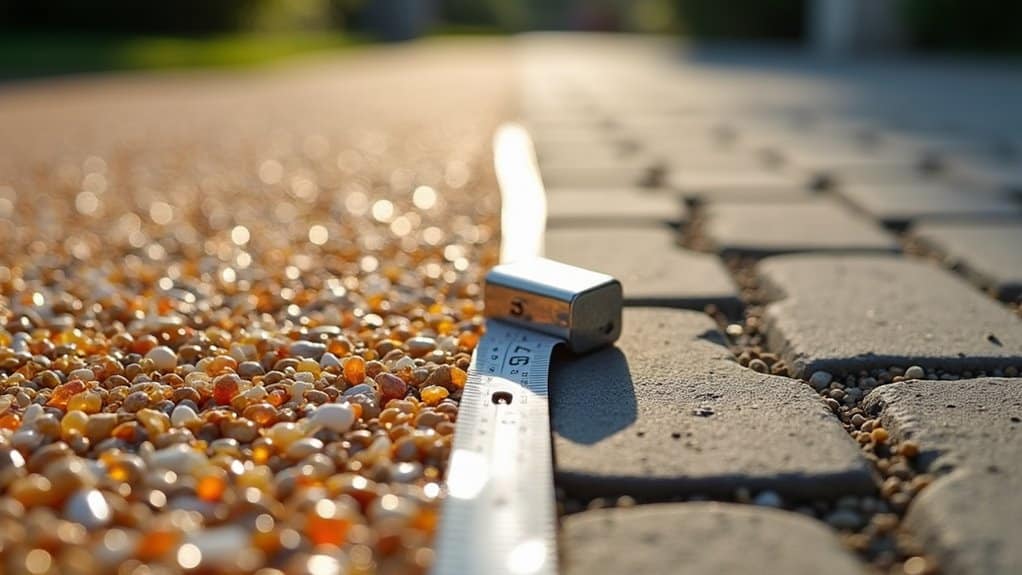Resin bound surfaces cost more upfront than traditional paving, ranging from £120-£190 per square metre compared to £6-£40 for concrete or brick alternatives. Whilst the initial investment is steeper, resin surfaces last up to 30 years and need little maintenance. Traditional paving often requires regular repairs and upkeep, which adds to the overall cost over time. The choice between the two depends on your budget and long-term plans for the space – resin proves cost-effective for those planning to stay put, while traditional paving might suit shorter-term projects.
Key Takeaways
Resin bound driveways and paths cost £120-£190 per square metre fully installed – quite a jump from traditional block paving at £38-£80 per square metre all in. But there's more to consider than just the upfront price.
While traditional paving needs regular weeding, cleaning and occasional re-pointing, resin bound surfaces need little more than an occasional sweep and pressure wash. Over 30 years of use, you'll spend far less time and money maintaining a resin surface compared to standard paving.
The environmental benefits stack up too. Resin bound surfaces let rainwater drain straight through, helping prevent flooding and puddles. Traditional paving often creates water run-off problems and heats up significantly in summer.
At 30 years' lifespan versus 20-25 years for traditional paving, resin bound surfaces typically work out as better value when factoring in durability and minimal upkeep costs. Worth the extra initial investment for many UK homeowners seeking a low-maintenance, long-lasting driveway solution.
Resin Bound Surface Overview
Resin bound surfaces pair natural stone aggregates with UV-resistant resin to create tough, attractive surfaces for driveways and paths. The finish offers plenty of design options, from classic marble looks to modern recycled glass, all available in various colours. Before laying, the base surface must be clean, level and dry. The ground temperature needs to be above 10°C for proper bonding. Additionally, the optimal resin to aggregate ratio of 7% is crucial for effective coating and performance. The mixture comes together in a forced-action mixer, combining resin and aggregates until properly blended. Workers then spread the mixture evenly across the prepared area to the right depth, smoothing it with trowels or rollers.
The surface needs 24 hours to cure properly, resulting in a solid, permeable finish. Resin bound surfaces make practical sense for British weather, as they're permeable, hard-wearing and need little upkeep. They are particularly suitable for residential and commercial properties due to their resistance to cracking and ability to support heavy weights. They're particularly good value when you consider their longevity and minimal maintenance needs.
Traditional Paving Options
Traditional Paving Options
Several reliable paving choices exist for driveways and paths in the UK. Common options include concrete, brick, flagstone, porcelain, and cobblestone pavers. Concrete pavers offer good value for money, whilst brick delivers classic kerb appeal. Flagstone works brilliantly in wet British weather thanks to its non-slip surface, and porcelain provides natural stone looks with added durability. Traditional cobblestones, whilst labour-intensive to lay, last for decades. Additionally, many of these options, such as concrete pavers, require sealing every 3-5 years to maintain their appearance and durability.
Most paving jobs need professional fitting to ensure proper installation and longevity. Cobblestone laying particularly requires careful attention to detail and takes longer than other options.
Though generally hassle-free, paving needs occasional maintenance – typically sealing and repairs for cracks or movement caused by British weather conditions. Traditional materials such as asphalt typically last 15-20 years, which may lead to higher ongoing expenses compared to resin driveways.
These options do have drawbacks. Most traditional pavers aren't permeable, which can cause drainage problems during heavy rainfall. The joins between pavers might also look untidy over time.
Consider these factors carefully when choosing the right paving for your property, weighing up looks, durability, and upkeep requirements.
Cost Breakdown: Resin Bound

The costs of resin bound surfacing break down into three key areas: materials, base preparation and labour.
Materials (resin and aggregate) cost £40-£70 per square metre. Premium aggregates and bespoke colours will push prices towards the higher end. The type of resin chosen also affects material costs. The use of permeable design in resin bound driveways allows for effective water drainage and can help mitigate flooding risks. Additionally, using UV-stable resin can significantly extend the lifespan of the driveway.
Base preparation typically runs £30-£50 per square metre. This varies based on your existing surface condition and drainage requirements. A properly prepared base is crucial for long-term durability.
Labour costs range from £50-£70 per square metre, depending on installation complexity. Larger areas or awkward shapes may need more time and effort, increasing the overall price.
Total installation costs usually fall between £120-£190 per square metre. Your final price will depend on location, specific design choices and the size of the area being covered.
Cost Breakdown: Traditional Paving
Understanding Traditional Paving Costs
Traditional paving costs vary significantly by material choice. Concrete pavers cost £6 to £12 per square metre, clay brick pavers range from £8 to £16, and natural stone pavers are the priciest at £10 to £40 per square metre.
Labour makes up a substantial portion of the total cost. Professional installation typically costs £32 to £40 per square metre, with average labour charges around £5 per square metre.
DIY projects work out cheaper, with combined material and labour costs between £10 to £14 per square metre. Additionally, costs are influenced by size of walkway, as larger projects often result in lower per square metre rates.
For a budget-friendly option, tarmac (asphalt) costs about £0.60 to £1.60 per square metre for hot-mix. Worth noting that whilst tarmac offers lower upfront costs, factors like durability and maintenance needs affect long-term value. The choice of material and installation method ultimately determines both initial costs and lasting performance.
Benefits of Resin Bound Surfaces

Resin bound surfaces deliver clear advantages for homes and businesses across the UK. The robust polyurethane resin stands up brilliantly to British weather and regular foot traffic without damage. Maintenance is minimal – just occasional brushing or pressure washing keeps these surfaces looking smart, and they naturally resist weeds and oil stains. Additionally, properly installed resin bound surfaces can extend their lifespan to up to 25 years with minimal upkeep, making them a long-term investment for property owners.
The UV-stable resin ensures colours stay true, even under our varied weather conditions. These surfaces are particularly good for our climate, being fully permeable. Rain simply drains through rather than forming puddles or running off, helping prevent localised flooding – a growing concern in many British neighbourhoods. This permeability is crucial for managing surface water, contributing to sustainable urban drainage systems (SuDS).
Working perfectly with sustainable drainage systems (SuDS), and using aggregates from UK quarries, they're an environmentally sound choice. The design options are practical yet striking, with many homeowners opting for custom blends that allow them to truly personalise their outdoor spaces. Whether you're after a smart driveway in Yorkshire stone tones or a modern garden path in contemporary colours, the finish is seamless and professional.
Perfect for everything from front drives to school playgrounds, resin bound surfaces combine smart looks with proper functionality – exactly what British properties need.
Advantages of Traditional Paving
Traditional paving offers key advantages that make it a popular choice for UK properties, both domestic and commercial. The main benefit is durability; materials like cobblestone, brick and concrete pavers typically last decades, with cobblestones often lasting more than a century. Additionally, traditional paving can provide a low maintenance surface that is appealing for busy households.
These materials stand up well to British weather and constant use, proving reliable for paths, driveways and patios.
While professional fitting is recommended, some traditional paving can be installed by competent DIYers. Cost-wise, traditional materials like asphalt and concrete are generally cheaper upfront. Property values often benefit from well-laid paving, and concrete pavers come in various colours and patterns to match different architectural styles.
Traditional pavers are simpler to maintain and fix compared to solid concrete slabs. If damaged, individual pavers can be replaced without disturbing the whole surface. Regular maintenance, including sealing, helps extend their life. Additionally, some traditional materials also allow water to drain through, helping manage rainfall and reducing flood risks – particularly useful for British weather, thereby addressing stormwater runoff concerns.
Traditional paving combines practical benefits with lasting kerb appeal.
Comparing Long-Term Costs

The proper cost comparison between resin bound driveways and standard paving must look beyond the price tag.
Whilst resin surfaces cost more at the outset, they typically save money over the years through minimal upkeep and impressive durability. In addition, the longevity of resin driveways is supported by their ability to withstand varying conditions, thanks to their better weather resistance.
Standard block paving often needs regular maintenance, including weed removal and repointing, which adds up yearly.
A resin driveway might cost £40-£70 per square metre initially, but its 20+ year lifespan and low maintenance needs often make it the shrewder investment. Additionally, the quality of materials used in resin bound installations significantly enhances their durability compared to traditional options.
When weighing up options, factor in both the immediate cost and the long-term value to your property.
Initial Investment Differences
Initial investment costs for resin bound driveways tend to be steeper than standard paving, with prices typically ranging from £120 to £190 per square metre.
Traditional block paving costs vary widely, particularly when using materials like natural stone, and often need regular resealing and weed treatment.
The groundwork affects overall pricing significantly. Resin bound surfaces need proper base preparation, adding £30 to £50 per square metre to the bill.
Traditional paving requires thorough sub-base work and joint filling, which takes more time and labour.
While resin bound surfaces cost more upfront, they're generally cheaper to maintain and last longer. Additionally, resin bound driveways have anti-slip properties that enhance safety, making them an ideal choice for families with children or elderly residents.
They also offer better design flexibility, with various colours and patterns available to boost your property's kerb appeal.
Though traditional paving might seem the budget-friendly choice initially, ongoing maintenance and repair costs often make resin bound surfaces more cost-effective over the years.
Maintenance Expense Comparison
Resin Bound Surface Maintenance Costs
Maintenance costs for resin bound surfaces work out significantly cheaper than traditional paving options over time. The robust surface quality and modern installation methods mean less ongoing maintenance.
Key cost benefits:
- Reduced upkeep: Naturally resistant to weeds and surface damage
- No resealing needed: Unlike tarmac, which needs regular resealing
- Minimal repairs: Better resistance to cracking and movement means fewer fixes
- Effective drainage: High water permeability prevents puddles and related damage
Additionally, the average total cost for a resin bound surface project is around $6,075.42, which reflects its durable nature. Traditional paving typically demands more frequent repairs, resealing and general maintenance, which adds up quickly.
Whilst the initial cost of resin bound surfaces might be higher, the long-term savings on maintenance make it a sound investment for UK properties.
Longevity and Replacement Costs
Longevity and Replacement Costs
The long-term investment in resin bound surfaces comes down to two key factors: how long they last and what it costs to replace them.
| Surface Type | Expected Lifespan |
|---|---|
| Resin Bound Surfaces | Up to 30 years |
| Traditional Paving | 20-25 years (up to 50 with care) |
| Permeable Pavers | 25-60 years |
Quality installation makes a massive difference to lifespan. A properly laid resin bound surface typically lasts 30 years, whilst standard paving might only reach 25 years in the same conditions. Think of it like fitting a kitchen – skilled installation with top materials ensures it stands the test of time. Additionally, the material quality of the resin and aggregates used plays a crucial role in determining the longevity of the surface.
Whilst resin bound surfaces cost more initially, they often work out cheaper over time due to their durability and low maintenance needs. Traditional paving might seem a bargain at first, but factor in earlier replacement and regular upkeep, and the costs soon mount up.
Environmental Impacts of Each Option
Environmental Impacts of Each Option
Resin-bound surfaces offer clear environmental advantages over traditional paving. These surfaces are permeable, meaning rainwater drains straight through them – particularly useful given the UK's wet climate. This natural drainage helps prevent localised flooding and tops up groundwater levels, whilst filtering out common pollutants like motor oil. Additionally, the permeability of resin-bound driveways allows for better groundwater replenishment, which minimizes strain on drainage systems. Furthermore, resin-bound surfaces are capable of storing up to 3,000 gallons of water, aiding in groundwater management.
Traditional paving comes with several environmental problems:
- Creates 'heat islands' in urban areas by trapping heat
- Causes water run-off, leading to flooding and pollution
- Needs frequent repairs, creating more waste
- Prevents natural water filtration into the ground
Resin-bound surfaces often contain recycled materials, such as crushed glass or rubber, making them a more sustainable choice.
Their long-lasting nature means less maintenance and fewer replacements over time. This durability, combined with their drainage properties, makes them particularly well-suited to British weather conditions and environmental standards, including SUDS (Sustainable Urban Drainage Systems) compliance.
Frequently Asked Questions
How Long Does a Resin Bound Surface Last?
A properly installed resin bound surface typically lasts 20-30 years – similar to the lifespan of a quality driveway. The durability depends heavily on the resin quality and workmanship, much like any building project. Regular maintenance, such as annual jet washing and prompt repairs of any small cracks (rather like looking after your car), will help ensure the surface reaches its full potential lifespan.
Can Resin Bound Surfaces Be Repaired if Damaged?
Yes, resin bound surfaces can be repaired effectively when damaged. Small cracks and chips can be fixed using matching resin compounds, whilst larger damaged areas might require section replacement. Regular maintenance, such as sweeping and occasional pressure washing, helps prevent damage and extends the surface's lifespan. For best results, repairs should be carried out by qualified professionals who understand the specific resin composition and installation techniques.
What Colors Are Available for Resin Bound Surfaces?
Natural and contemporary colour choices are available for resin bound surfaces across the UK. Popular options include classic greys like slate and granite, warm browns that match Cotswold stone, golden buff tones reminiscent of British beaches, and crisp cream shades that complement modern homes. Each colour can be mixed to match existing garden features or house brickwork.
Is Resin Bound Suitable for Heavy Vehicle Traffic?
Resin bound driveways can withstand heavy vehicles when properly installed, though they're best suited for domestic traffic rather than constant commercial use. For regular HGV access or industrial sites, it's worth opting for a higher specification mix and deeper base layers. Quality materials and professional installation are essential – much like choosing between budget and premium tyres for your car, the initial investment pays off in longevity.
How Does Temperature Affect Resin Bound Installation?
Temperature plays a crucial role in resin bound surfacing. Working outside the ideal range (5-25°C) can cause significant problems. In summer heat, the resin may cure too quickly, whilst cold weather slows the process and can prevent proper bonding. For best results, install on dry days with stable temperatures – much like choosing the right conditions for laying concrete on your driveway.
Conclusion
Comparing resin bound surfaces with traditional paving is straightforward when you look at the facts. Resin bound surfaces typically cost £50-£75 per square metre, whilst traditional block paving ranges from £30-£50. Though initially pricier, resin bound surfaces often prove cost-effective over time, needing less maintenance than standard concrete or tarmac drives. Think of it like choosing between a quality raincoat or a cheap umbrella – the upfront investment often pays off. Both options are perfectly sound for UK weather, but resin bound surfaces offer better drainage, particularly useful for our rainy climate. Your choice should balance your budget against practical needs, keeping in mind future upkeep costs.
